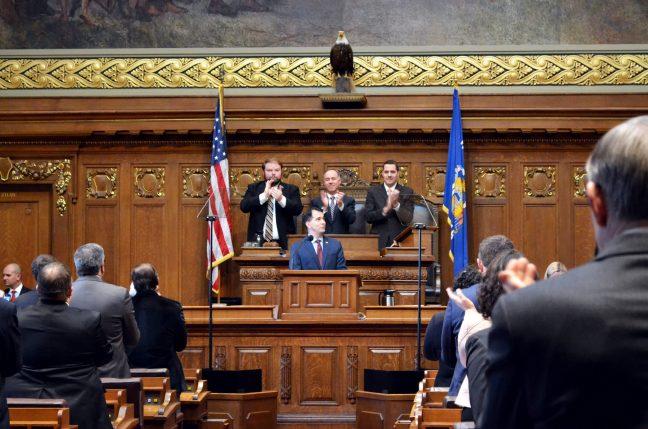A veto from Governor Scott Walker in the recently signed budget requires the University of Wisconsin Flexible Option program double the number of programs available for study, but the budget allocates no additional funds for the new increase in programs.
UW Colleges and UW Extension Chancellor Cathy Sandeen said the UW System’s Flexible Option program started in 2014 to help provide non-traditional students with additional options for obtaining a degree.
Flexible Option students do not pay per credit, instead they pay for the time it takes them to complete a program. Students can work on their coursework whenever they have time, which means the faster they move through the program, the more money they save, according to their website.
The budget requires the new programs to be added within the next two years, before Dec. 1, 2019.
Robert Kelchen, an expert in competency-based education, said the success of the expansion depends on where the money is drawn from.
“It does have appeal to working adults who otherwise may not have a path for a degree, and the flex option is cheaper than a lot of the other online course options out there,” Kelchen said. “If you move quickly, the flex option can work out really well.”
Sandeen said many Flexible Option students are adults who are in the workforce.
According to Sandeen, there are two main reasons adults decide to enroll in Flexible Option, and that workforce experience prepares them to move quickly through the programs.
“Older, working adults who desire to either move up in their current career and learn more and get other credentials that would qualify them to move up, and some people in that category want to shift careers to a different area,” Sandeen said. “Because so many adults have learned things on the job, or learned things in professional development programs, they can make progress pretty quickly and flexibly as they go along.”
Currently, there are eight degree and certificate programs offered through Flexible Option. The certificate programs differ from the bachelor’s degree programs in that they are shorter and focus more on job related skills.
Because the program was only founded in 2014, Sandeen said having eight well-developed programs is an excellent start.
But the new budget requires adding eight new programs in a short span of time. Sandeen said this will be a challenge for the program, but one that they are up to facing.
“We’re trying to do it in the most efficient way possible,” Sandeen said.
With the expansion, Sandeen said the program hopes to add options to meet the needs of the current workforce.
Sandeen said there are nursing and business degree options, but they’re working to add more programs that serve to STEM majors.
“I think that it’ll be important for us to pinpoint the specific programs, whether it’s a degree or a certificate, that are really targeted at those workforce needs,” Sandeen said. “Really looking at, what are the workforce needs, what are the jobs that people need training in, I think we’ll probably look at the certificate programs as a good option, and those are typically shorter than a degree program.”
Sandeen hopes that offering more programs will increase enrollment in Flexible Option. She said more degree options will open the door for nontraditional students looking to further their education and will serve people in a previously untapped market.
Overall, Sandeen believes this expansion will be beneficial for Flexible Option and the students it serves.
“I’m excited about the opportunity that this would provide for the people of Wisconsin,” Sandeen said.


